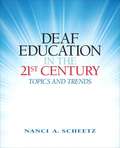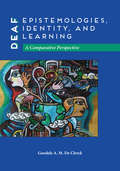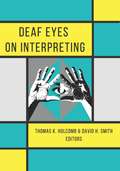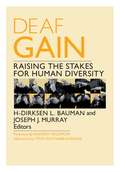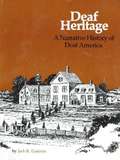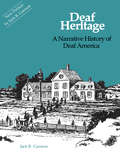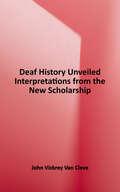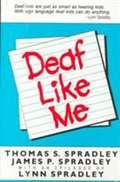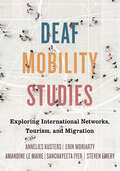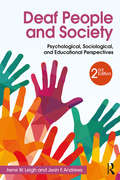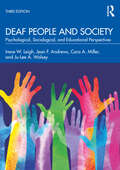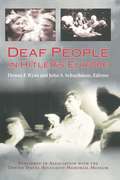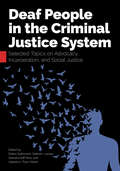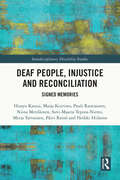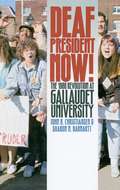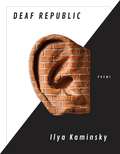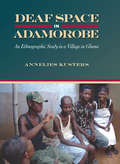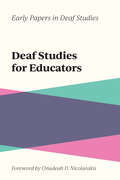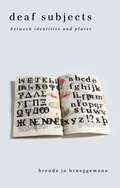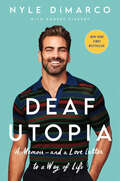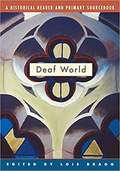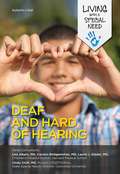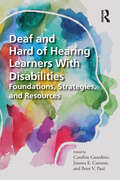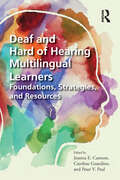- Table View
- List View
Deaf Education in the 21st Century: Topics and Trends
by Nanci A. ScheetzAs the author writes in his preface to the edition, Deaf education in the 21st century has and will continue to undergo a rapid transformation primarily due to the advent of technological advances, innovative educational opportunities, and shrinking cultural boundaries. This text provides professionals, preservice teachers, interpreters, counselors, and other related personnel with a broad and balanced perspective on current topics and trends germane to the field today. In the coverage of a wide array of topics that include educational perspectives, psychosocial precepts, communication modes, cochlear implants, advances in hearing-aid technology, and other timely and relevant topics, the reader is exposed to a panoramic view of a complex field rather than an in-depth analysis of each of the major dimensions. This text is a sourcebook on the many dimensions found within the field of deaf education. Designed as a teaching-learning vehicle, basic concepts recur in varying situations, and illustrations and some concepts are repeated in diverging contexts to promote comprehension and enhance retention.
Deaf Epistemologies, Identity, and Learning: A Comparative Perspective
by Goedele A. De ClerckGoedele A. M. De Clerck presents cross-cultural comparative research that examines and documents where deaf flourishing occurs and how it can be advanced. She spotlights collective and dynamic resources of knowledge and learning; the coexistence of lived differences; social, linguistic, cultural, and psychological capital; and human potential and creativity. Deaf Epistemologies, Identity, and Learning argues for an inclusive approach to the intrinsic human diversity in society, education, and scholarship, and shows how emotions of hope, frustration, and humiliation contribute to the construction of identity and community. De Clerck also considers global to local dynamics in deaf identity, deaf culture, deaf education, and deaf empowerment. She presents empirical research through case studies of the emancipation processes for deaf people in Flanders (a region of Belgium), the United States (specifically, at Gallaudet University in Washington, DC), and the West African nation of Cameroon. These three settings illuminate different phases of emancipation in different contexts, and the research findings are integrated into a broader literature review and subjected to theoretical reflection. De Clerck’s anthropology of deaf flourishing draws from her critical application of the empowerment paradigm in settings of daily life, research, leadership, and community work, as she explores identity and well-being through an interdisciplinary lens. This work is centered around practices of signed storytelling and posits learning as the primary access and pathway to culture, identity, values, and change. Change driven by the learning process is considered an awakening—and through this awakening, the deaf community can gain hope, empowerment, and full citizenship. In this way, deaf people are allowed to shape their histories, and the result is the elevation of all aspects of deaf lives around the world.
Deaf Eyes on Interpreting
by Thomas K. Holcomb David H. SmithAs the ASL-English interpreting field has become professionalized, there is a growing disconnect between interpreters and the Deaf consumers they serve. Whereas interpreting used to be a community-based practice, the field is growing into a research-based profession that begins in a classroom rather than in the Deaf community. Despite the many gains being made in the interpreting services profession, with an emphasis on the accuracy of the interpreted work, the perspectives of Deaf individuals are rarely documented in the literature. Opportunities for enhanced participation and full inclusion need to be considered in order for Deaf people to best represent themselves to the hearing, nonsigning public as competent and intelligent individuals. Deaf Eyes on Interpreting brings Deaf people to the forefront of the discussions about what constitutes quality interpreting services. The contributors are all Deaf professionals who use interpreters on a regular basis, and their insights and recommendations are based on research as well as on personal experiences. These multiple perspectives reveal strategies to maximize access to interpreted work and hearing environments and to facilitate trust and understanding between interpreters and Deaf consumers. Interpreter educators, interpreting students, professional interpreters, and Deaf individuals will all benefit from the approaches offered in this collection.
Deaf Gain: Raising the Stakes for Human Diversity
by H-Dirksen L. Bauman Joseph J. MurrayDeaf people are usually regarded by the hearing world as having a lack, as missing a sense. Yet a definition of deaf people based on hearing loss obscures a wealth of ways in which societies have benefited from the significant contributions of deaf people. In this bold intervention into ongoing debates about disability and what it means to be human, experts from a variety of disciplines—neuroscience, linguistics, bioethics, history, cultural studies, education, public policy, art, and architecture—advance the concept of Deaf Gain and challenge assumptions about what is normal.Through their in-depth articulation of Deaf Gain, the editors and authors of this pathbreaking volume approach deafness as a distinct way of being in the world, one which opens up perceptions, perspectives, and insights that are less common to the majority of hearing persons. For example, deaf individuals tend to have unique capabilities in spatial and facial recognition, peripheral processing, and the detection of images. And users of sign language, which neuroscientists have shown to be biologically equivalent to speech, contribute toward a robust range of creative expression and understanding. By framing deafness in terms of its intellectual, creative, and cultural benefits, Deaf Gain recognizes physical and cognitive difference as a vital aspect of human diversity.Contributors: David Armstrong; Benjamin Bahan, Gallaudet U; Hansel Bauman, Gallaudet U; John D. Bonvillian, U of Virginia; Alison Bryan; Teresa Blankmeyer Burke, Gallaudet U; Cindee Calton; Debra Cole; Matthew Dye, U of Illinois at Urbana–Champaign; Steve Emery; Ofelia García, CUNY; Peter C. Hauser, Rochester Institute of Technology; Geo Kartheiser; Caroline Kobek Pezzarossi; Christopher Krentz, U of Virginia; Annelies Kusters; Irene W. Leigh, Gallaudet U; Elizabeth M. Lockwood, U of Arizona; Summer Loeffler; Mara Lúcia Massuti, Instituto Federal de Santa Catarina, Brazil; Donna A. Morere, Gallaudet U; Kati Morton; Ronice Müller de Quadros, U Federal de Santa Catarina, Brazil; Donna Jo Napoli, Swarthmore College; Jennifer Nelson, Gallaudet U; Laura-Ann Petitto, Gallaudet U; Suvi Pylvänen, Kymenlaakso U of Applied Sciences; Antti Raike, Aalto U; Päivi Rainò, U of Applied Sciences Humak; Katherine D. Rogers; Clara Sherley-Appel; Kristin Snoddon, U of Alberta; Karin Strobel, U Federal de Santa Catarina, Brazil; Hilary Sutherland; Rachel Sutton-Spence, U of Bristol, England; James Tabery, U of Utah; Jennifer Grinder Witteborg; Mark Zaurov.
Deaf Heritage: A Narrative History of Deaf America
by Jack GannonThis in-depth history of Deaf America begins with an overview of the early years. Each chapter then covers a decade of history, beginning with 1880. The text is supplemented by marvelous pictures, illustrations, vignettes and biographical profiles. "Subchapters" chronicle the multi-facited dimensions of Deaf culture by focusing on Deaf athletes and more. A complete Deaf Culture course!
Deaf Heritage: A Narrative History of Deaf America
by Jack R. GannonNow, Jack R. Gannon's original groundbreaking volume on Deaf history and culture is available once again. In Deaf Heritage: A Narrative History of Deaf America, Gannon brought together for the first time the story of the Deaf experience in America from a Deaf perspective. Recognizing the need to document the multifaceted history of this unique minority with its distinctive visual culture, he painstakingly gathered as much material as he could on Deaf American life. The result is a 17-chapter montage of artifacts and information that forms an utterly fascinating record from the early nineteenth century to the time of its original publication in 1981.<P><P> Deaf Heritage tracks the development of the Deaf community both chronologically and by significant subjects. The initial chapter treats the critical topics of early attempts at deaf education, the impact of Deaf and Black deaf teachers, the establishment of schools for the deaf, and the founding of Gallaudet College. Individual chapters cover the 1880s through the 1970s, mixing milestones such as the birth of the National Association of the Deaf and the work of important figures, Deaf and hearing, with anecdotes about day-to-day deaf life. Other chapters single out important facets of Deaf culture: American Sign Language, Deaf Sports, Deaf artists, Deaf humor, and Deaf publications. The overall effect of this remarkable record, replete with archival photographs, tables, and lists of Deaf people's accomplishments, reveals the growth of a vibrant legacy singular in American history.<P> Advisory: Bookshare has learned that this book offers only partial accessibility. We have kept it in the collection because it is useful for some of our members. To explore further access options with us, please contact us through the Book Quality link on the right sidebar. Benetech is actively working on projects to improve accessibility issues such as these.
Deaf History Unveiled: Interpretations from the New Scholarship
by John Vickrey Van CleveDeaf History Unveiled features 16 essays, including work of Harlan Lane, Renate Fischer, Margret Winzer, William McCagg, and other noted historians in this field. Readers will discover the new themes driving Deaf history, including a telling comparison of the similar experiences of Deaf people and African Americans, both minorities with identifying characteristics that cannot be hidden to thwart bias. Other studies track societal paternalism toward deaf people in Italy, Hungary, and the United States. Adding to its intrigue, the new research in this milestone study provides evidence for previously uncredited self-determination of Deaf people in establishing education, employment, and social structures common throughout the Northern Hemisphere. Historians, teachers, and students will prize Deaf History Unveiled as a singular collection of insights that will change historical perspectives on the Deaf experience worldwide.
Deaf Like Me
by Thomas S. Spradley James P. Spradley<P>Deaf Like Me is the moving account of parents coming to terms with their baby girl's profound deafness. The love, hope, and anxieties of all hearing parents of deaf children are expressed here with power and simplicity. <P>In the epilogue, Lynn Spradley as a teenager reflects upon being deaf, her education, her struggle to communicate, and the discovery that she was the focus of her father's and uncle's book. At once moving and inspiring, Deaf Like Me is must reading for every parent, relative, and friend of deaf children everywhere.
Deaf Mobility Studies: Exploring International Networks, Tourism, and Migration
by Erin Moriarty Annelies Kusters Amandine le Maire Sanchayeeta Iyer Steven EmeryDeaf Mobility Studies revolutionizes how we think about deaf people’s international experiences. Equipped with a common theoretical framework, a team of five deaf ethnographers journeyed alongside their participants to delve into a rich array of experiences — ranging from career advancements and marriages to tourism and the challenges faced by deaf refugees. The authors present their findings within the framework of Deaf Mobility Studies, which brings together the transdisciplinary fields of Deaf Studies and Mobility Studies. Far from taking 'deaf cosmopolitanism' as a given, this work scrutinizes it as a multifaceted phenomenon to be both affirmed and questioned. Themes that emerge include how deaf people seek spaces of belonging, engage in languaging, expand their networks, and experience immobility. The text is augmented by direct links to clips in nine ethnographic films, analysis of selected film excerpts and screenshots, and compelling data visualizations. Deaf Mobility Studies is an expansive odyssey through the complexities and opportunities inherent in deaf international mobility.
Deaf People and Society: Psychological, Sociological and Educational Perspectives
by Irene W. Leigh Jean F. AndrewsDeaf People and Society incorporates multiple perspectives related to the topics of psychology, education, and sociology, including the viewpoints of deaf adults themselves. In doing so, it considers the implications of what it means to be deaf or hard of hearing and how deaf adults’ lives are impacted by decisions that professionals make, whether in the clinic, the school, or when working with family. This second edition has been thoroughly revised and offers current perspectives on the following topics:<P><P> * Etiologies of deafness and the identification process<P> * The role of auditory access<P> * Cognition, language, communication, and literacy<P> * Bilingual, bilingual/bimodal, and monolingual approaches to language learning<P> * Educational, legal, and placement aspects<P> * Childhood psychological issues<P> * Psychological and sociological viewpoints of deaf adults<P> * The criminal justice system and deaf people<P> * Psychodynamics of interaction between deaf and hearing people<P> Each chapter begins with a set of objectives and concludes with suggested readings for further research. This edition contains 10 new and original case studies, including ones on hearing children of deaf adults, sudden hearing loss, a young deaf adult with mental illness, and more. Written by a seasoned deaf/hearing bilingual team, this unique text continues to be the go-to resource for students and future professionals interested in working with deaf and hard-of-hearing persons.
Deaf People and Society: Psychological, Sociological, and Educational Perspectives
by Irene W. Leigh Jean F. Andrews Cara A. Miller Ju-Lee A. WolseyDeaf People and Society is an authoritative text that emphasizes the complexities of being D/deaf, DeafBlind, Deaf-Disabled, or hard of hearing, drawing on perspectives from psychology, education, and sociology. This book also explores how the lives of these individuals are impacted by decisions made by professionals in clinics, schools, or other settings. This new edition offers insights on areas critical to Deaf Studies and Disability Studies, with particular emphasis on multiculturalism, equity, and inclusion. Accessibly written, the chapters include objectives and suggested further reading that provides valuable leads and context. Additionally, these chapters have been thoroughly revised and incorporate a range of relevant topics including etiologies of deafness; cognition and communication; bilingual, bimodal, and monolingual approaches to language learning; childhood psychological issues; psychological and sociological viewpoints of deaf adults; the criminal justice system and deaf people; psychodynamics of interaction between deaf and hearing people; and future trends. The book also includes case studies covering hearing children of deaf adults, a young deaf adult with mental illness, and more. Written by a seasoned D/deaf/hard of hearing and hearing bilingual team, this unique text continues to be the go-to resource for students and future professionals interested in working with D/deaf, DeafBlind, and hard-of-hearing persons. Its contents will resonate with anyone interested in serving and enhancing their knowledge of their lived experiences of D/deaf, DeafBlind, Deaf-Disabled, and hard-of-hearing people and communities.
Deaf People and Society: Psychological, Sociological, and Educational Perspectives
by Irene W. Leigh Jean F. Andrews Cara A. Miller Ju-Lee A. WolseyDeaf People and Society is an authoritative text that emphasizes the complexities of being D/deaf, DeafBlind, Deaf-Disabled, or hard of hearing, drawing on perspectives from psychology, education, and sociology. This book also explores how the lives of these individuals are impacted by decisions made by professionals in clinics, schools, or other settings. This new edition offers insights on areas critical to Deaf Studies and Disability Studies, with particular emphasis on multiculturalism and multilingualism, as well as diversity, equity, and inclusion. Accessibly written, the chapters include objectives and suggested further reading that provides valuable leads and context. Additionally, these chapters have been thoroughly revised and incorporate a range of relevant topics including etiologies of deafness; cognition and communication; bilingual, bimodal, and monolingual approaches to language learning; childhood psychological issues; psychological and sociological viewpoints of deaf adults; the criminal justice system and deaf people; psychodynamics of interaction between deaf and hearing people; and future trends. The book also includes case studies covering hearing children of deaf adults, a young deaf adult with mental illness, and more.Written by a seasoned D/deaf/hard of hearing and hearing bilingual team, this unique text continues to be the go-to resource for students and future professionals interested in working with D/deaf, DeafBlind, and hard-of-hearing persons. Its contents will resonate with anyone interested in serving and enhancing their knowledge of their lived experiences of D/deaf, DeafBlind, Deaf-Disabled, and hard-of-hearing people and communities.
Deaf People in Hitler's Europe
by John S. Schuchman Donna F. RyanInspired by the conference "Deaf People in Hitler's Europe, 1933-1945," hosted jointly by Gallaudet University and the United States Holocaust Memorial Museum in 1998, this extraordinary collection, organized into three parts, integrates key presentations and important postconference research. Henry Friedlander begins "Part I: Racial Hygiene" by analyzing the assault on deaf people and people with disabilities as an integral element in the Nazi attempt to implement their theories of racial hygiene. Robert Proctor documents the role of medical professionals in deciding who should be sterilized or forbidden to marry, and whom the Nazi authorities would murder. In an essay written especially for this volume, Patricia Heberer details how Nazi manipulation of eugenics theory and practice facilitated the justification for the murder of those considered socially undesirable. "Part II: The German Experience" commences with Jochen Muhs's interviews of deaf Berliners who lived under Nazi rule, both those who suffered abuse and those who, as members of the Nazi Party, persecuted others, especially deaf Jews. John S. Schuchman describes the remarkable 1932 film Misjudged People, which so successfully portrayed the German deaf community as a vibrant contributor to society that the Nazis banned its showing when they came to power. Horst Biesold's contribution confirms the complicity of teachers who denounced their own students, labeling them hereditarily deaf and thus exposing them to compulsory sterilization. The section also includes the reprint of a chilling 1934 article entitled "The Place of the School for the Deaf in the New Reich," in which author Kurt Lietz rued the expense of educating deaf students, who could not become soldiers or bear "healthy children." In "Part III: The Jewish Deaf Experience," John S. Schuchman discusses the plight of deaf Jews in Hungary. His historical analysis is complemented by a chapter containing excerpts from the testimony of six deaf Jewish survivors who describe their personal ordeals. Peter Black's reflections on the need for more research conclude this vital study of a little-known chapter of the Holocaust.
Deaf People in the Criminal Justice System: Selected Topics on Advocacy, Incarceration, and Social Justice
by Debra Guthmann Gabriel I. Lomas Damara Goff Paris Gabriel A. “Tony” MartinThe legal system is complex, and without appropriate access, many injustices can occur. Deaf people in the criminal justice system are routinely denied sign language interpreters, videophone access, and other accommodations at each stage of the legal process. The marginalization of deaf people in the criminal justice system is further exacerbated by the lack of advocates who are qualified to work with this population. Deaf People in the Criminal Justice System: Selected Topics on Advocacy, Incarceration, and Social Justice is the first book to illuminate the challenges faced by deaf people when they are arrested, incarcerated, or navigating the court system. This volume brings interdisciplinary contributors together to shed light on both the problems and solutions for deaf people in these circumstances. The contributors address issues such as accessibility needs; gaps regarding data collection and the need for more research; additional training for attorneys, court personnel, and prison staff; the need for more qualified sign language interpreters, including Certified Deaf Interpreters who provide services in court, prison, and juvenile facilities; substance use disorders; the school to prison nexus; and the need for advocacy. Students in training programs, researchers, attorneys, mental health professionals, sign language interpreters, family members, and advocates will be empowered by this much-needed resource to improve the experiences and outcomes for deaf people in the criminal justice system.
Deaf People, Injustice and Reconciliation: Signed Memories (Interdisciplinary Disability Studies)
by Hisayo Katsui Heikki Hiilamo Maija Koivisto Pauli Rautiainen Niina Meriläinen Suvi-Maaria Tepora-Niemi Merja Tarvainen Päivi RainoThis book focuses on injustices that have taken place to deaf people and the sign language community in Finland from 1900.For decades, memories and stories about past injustices have been passed down from one generation to another among deaf people and the sign language community. This research explains this history from the perspective of deaf people and their community and contributes to the truth and reconciliation process of the Finnish Government with the community, which is globally the first of its kind.Using participatory research methods, it is relevant for Disability Studies, Social Work, and Human Rights Studies, Political Science and History.
Deaf President Now!: The 1988 Revolution at Gallaudet University
by Sharon N. Barnartt John B. ChristiansenDeaf President Now! reveals the groundswell leading up to the history-making week in 1988 when the students at Gallaudet University seized the campus and closed it down until their demands were met. To research this probing study, the authors interviewed in-depth more than 50 of the principal players. This telling book reveals the critical role played by a little-known group called the "Ducks," a tight-knit band of six alumni determined to see a deaf president at Gallaudet. Deaf President Now! details how they urged the student leaders to ultimate success, including an analysis of the reasons for their achievement in light of the failure of many other student movements. This fascinating study also scrutinizes the lasting effects of this remarkable episode in "the civil rights movement of the deaf." Deaf President Now! tells the full story of the insurrection at Gallaudet University, an exciting study of how deaf people won social change for themselves and all disabled people everywhere through a peaceful revolution.
Deaf Republic: Poems
by Ilya KaminskyFinalist for the National Book Award • Finalist for the PEN/Jean Stein Award • Finalist for the National Book Critics Circle Award • Winner of the Los Angeles Times Book Prize • Winner of the Anisfield-Wolf Book Award • Winner of the National Jewish Book Award • Finalist for the Kingsley Tufts Poetry Award • Finalist for the T. S. Eliot Prize • Finalist for the Forward Prize for Best CollectionIlya Kaminsky’s astonishing parable in poems asks us, What is silence?Deaf Republic opens in an occupied country in a time of political unrest. When soldiers breaking up a protest kill a deaf boy, Petya, the gunshot becomes the last thing the citizens hear—they all have gone deaf, and their dissent becomes coordinated by sign language. The story follows the private lives of townspeople encircled by public violence: a newly married couple, Alfonso and Sonya, expecting a child; the brash Momma Galya, instigating the insurgency from her puppet theater; and Galya’s girls, heroically teaching signing by day and by night luring soldiers one by one to their deaths behind the curtain. At once a love story, an elegy, and an urgent plea, Ilya Kaminsky’s long-awaited Deaf Republic confronts our time’s vicious atrocities and our collective silence in the face of them.
Deaf Space in Adamorobe: An Ethnographic Study in a Village in Ghana
by Annelies KustersShared signing communities consist of a relatively high number of hereditarily deaf people living together with hearing people in relative isolation. In the United States, Martha's Vineyard gained mythical fame as a paradise for deaf people where everyone signed up until the 19th century. That community disappeared when deaf people left the island, newcomers moved in, married locals, and changed the gene pool. These unique communities still exist, however, one being the Akan village in Ghana called Adamorobe. Annelies Kusters, a deaf anthropologist, traveled to Adamorobe to conduct an ethnographic study of how deaf and hearing people live together in the village. In her new book, Kusters reveals how deaf people in Adamorobe did not live in a social paradise and how they created "deaf spaces" by seeking each other out. Deaf Space in Adamorobe reveals one example of the considerable variation in shared signing communities regarding rates of sign language proficiency and use, deaf people's marriage rates, deaf people's participation in village economies and politics, and the role of deaf education. Kusters describes spaces produced by both deaf and hearing people as a cohesive community where living together is an integral fact of their sociocultural environments. At the same time, Kusters identifies tension points between deaf and hearing perspectives and also between outside perspectives and discourses that originated within the community. Because of these differences and the relatively high number of deaf people in the community, Kusters concludes it is natural that they form deaf spaces within the shared space of the village community.
Deaf Studies for Educators (Early Papers in Deaf Studies #2)
by Onudeah D. NicolarakisAs Deaf Studies emerged in the 1970s and 1980s as a field of academic study and inquiry, the importance of Deaf Studies in education became an area of interest among thought leaders of the time. Deaf Studies for Educators is a collection of papers from a 1991 conference convened to explore Deaf Studies as a framework for teaching and learning. American Sign Language literature and poetry, bilingual and bicultural programs, arts and history, and deaf identity are several of the topics covered. This collection captures how educators understood early on the benefits of a curriculum that was more fully inclusive and reflective of deaf culture and deaf experiences. A foreword by Onudeah D. Nicolarakis contextualizes the work for modern audiences. This is the second volume in the Early Papers in Deaf Studies series, which consists of reissued works originally published by the Gallaudet University College for Continuing Education but long out of print. The aim of this series is to restore these foundational papers to the scholarly community. Deaf Studies for Educators is available in both print and open digital formats, ensuring broad access to this important contribution to the literature.
Deaf Subjects: Between Identities and Places (Cultural Front #12)
by Brenda Jo BrueggemannIn this probing exploration of what it means to be deaf, Brenda Brueggemann goes beyond any simple notion of identity politics to explore the very nature of identity itself. Looking at a variety of cultural texts, she brings her fascination with borders and between-places to expose and enrich our understanding of how deafness embodies itself in the world, in the visual, and in language.Taking on the creation of the modern deaf subject, Brueggemann ranges from the intersections of gender and deafness in the work of photographers Mary and Frances Allen at the turn of the last century, to the state of the field of Deaf Studies at the beginning of our new century. She explores the power and potential of American Sign Language—wedged, as she sees it, between letter-bound language and visual ways of learning—and argues for a rhetorical approach and digital future for ASL literature.The narration of deaf lives through writing becomes a pivot around which to imagine how digital media and documentary can be used to convey deaf life stories. Finally, she expands our notion of diversity within the deaf identity itself, takes on the complex relationship between deaf and hearing people, and offers compelling illustrations of the intertwined, and sometimes knotted, nature of individual and collective identities within Deaf culture.
Deaf Utopia: A Memoir—and a Love Letter to a Way of Life
by Nyle DiMarco Robert SiebertA heartfelt and inspiring memoir and celebration of Deaf culture by Nyle DiMarco, actor, producer, two-time reality show winner, and cultural icon of the international Deaf communityBefore becoming the actor, producer, advocate, and model that people know today, Nyle DiMarco was half of a pair of Deaf twins born to a multi-generational Deaf family in Queens, New York. At the hospital one day after he was born, Nyle “failed” his first test—a hearing test—to the joy and excitement of his parents.In this engrossing memoir, Nyle shares stories, both heartbreaking and humorous, of what it means to navigate a world built for hearing people. From growing up in a rough-and-tumble childhood in Queens with his big and loving Italian-American family to where he is now, Nyle has always been driven to explore beyond the boundaries given him. A college math major and athlete at Gallaudet—the famed university for the Deaf in Washington, DC—Nyle was drawn as a young man to acting, and dove headfirst into the reality show competitions America’s Next Top Model and Dancing with the Stars—ultimately winning both competitions.Deaf Utopia is more than a memoir, it is a cultural anthem—a proud and defiant song of Deaf culture and a love letter to American Sign Language, Nyle’s primary language. Through his stories and those of his Deaf brothers, parents, and grandparents, Nyle opens many windows into the Deaf experience.Deaf Utopia is intimate, suspenseful, hilarious, eye-opening, and smart—both a memoir and a celebration of what makes Deaf culture unique and beautiful.
Deaf World: A Historical Reader and Primary Sourcebook
by Lois BraggTo many who hear, the deaf world is as foreign as a country never visited. Deaf World thus concerns itself less with the perspectives of the hearing and more with what Deaf people themselves think and do. Editor Lois Bragg asserts that English is for many signing people a second, infrequently used language and that Deaf culture is the socially transmitted pattern of behavior, values, beliefs, and expression of those who use American Sign Language. She has assembled an astonishing array of historical sources, political writings, and personal memoirs, from classic 19th-century manifestos to contemporary policy papers, on everything from eugenics to speech and lipreading, the right to work and marry, and the never-ending controversy over separation vs. social integration. At the heart of many of the selections lies the belief that Deaf Americans have long constituted an internal colony of sorts in the United States. While not attempting to speak for Deaf people en masse, this ambitious platform anthology places the Deaf on center stage, offering them an opportunity to represent the world--theirs as well as the hearing world--from a Deaf perspective. For Deaf readers, the book will be welcomed as a gift, both a companion to be savored and, as often, an opponent to be engaged and debated. And for the hearing, it serves as an unprecedented guide to a world and a culture so often overlooked. Comprising a judicious mix of published pieces and original essays solicited specifically for this volume, Deaf World marks a major contribution.
Deaf and Hard of Hearing
by Autumn LibalIn a world where most educational and social systems are designed for people who can hear, being deaf or hard of hearing presents young people with a unique set of challenges. They must find ways to communicate and overcome discrimination. In this book you will read about Denzel, who has never missed being able to hear. He was born deaf, and the idea of "sound" is confusing to him. As you follow Denzel's journey through a world designed for the hearing, you'll see him find ways to overcome the challenges of communicating with others. Being deaf doesn't have to be a handicap--and it won't keep Denzel from exploring, learning, or accomplishing his dreams!
Deaf and Hard of Hearing Learners With Disabilities: Foundations, Strategies, and Resources
by Peter V. Paul Caroline Guardino Joanna E. CannonThis volume offers foundational information and research-based strategies for meeting the needs of deaf and hard of hearing learners with disabilities. The disabilities covered in this volume include developmental delays, autism spectrum disorder, intellectual and learning disabilities, deafblindness, emotional and behavioral disorders, attention deficit hyperactivity disorder, and a variety of high incidence syndromes. Contributors examine the literature within each disability category, share best practices, and consider demographics/characteristics, intervention/identification, placement, communication/language, psychosocial issues, assistive technologies/accommodations, assessments, and transition/post-secondary outcomes. Each chapter begins with learning objectives and concludes with discussion questions and a resource list. Deaf and Hard of Hearing Learners with Disabilities is an essential book for courses at the undergraduate and graduate level, and in workshops and webinars for in-service teachers, professionals, and families.
Deaf and Hard of Hearing Multilingual Learners: Foundations, Strategies, and Resources
by Peter V. Paul Caroline Guardino Joanna E. CannonThis critical resource provides foundational information and practical strategies for d/Deaf or hard of hearing (d/Dhh) multilingual learners. These learners come from backgrounds where their home languages differ from the dominant spoken or sign languages of the culture. This book is a one-stop resource for professionals, interventionists, and families, helping them to effectively support the diverse needs of d/Dhh multilingual learners by covering topics such as family engagement, assessment, literacy, multiple disabilities, transition planning, and more. The book provides vignettes of learners from 25 countries, discussion questions, and family-centered infographic briefs that synthesize each chapter. Deaf and Hard of Hearing Multilingual Learners is a groundbreaking step towards better supporting the many languages and cultures d/Dhh students experience in their lifetimes through strength-based and linguistically responsive approaches.
